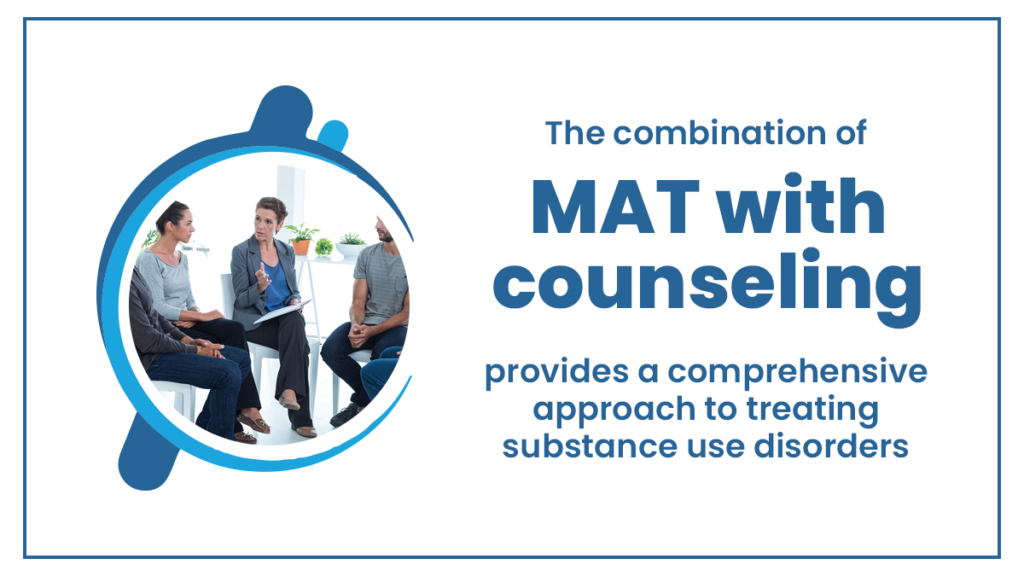Opioid addiction is a complex and challenging issue affecting millions worldwide. Fortunately, medication-assisted treatment (MAT) has emerged as a highly effective approach for supporting recovery from opioid addiction.
Among the various MAT options available, three medications have gained significant attention that are buprenorphine, methadone, and naltrexone. Each of these medications offers unique benefits and considerations. This article will delve into a comprehensive comparison of MAT.

Read more to explore their mechanisms of action, efficacy, side effects, and other factors in treating substance use disorders. The Haven Detox-South Florida is one of the best rehab centers in the United States that offer effective MAT treatment and therapy programs to treat addiction or other mental health problems.
Key Takeaways
Medication-assisted treatment (MAT) plays a crucial role in addiction treatment.
Here are some of the key takeaways from the article:
- MAT medications, such as methadone, buprenorphine, and naltrexone, help manage withdrawal symptoms and reduce cravings.
- These medications target the brain’s opioid receptors, stabilizing brain chemistry and assisting in recovery.
- The combination of MAT with counseling provides a comprehensive approach to treating substance use disorders.
- MAT medications are effective in treating opioid use disorder, reducing illicit opioid use, and preventing overdose.
The Haven Detox-South Florida offers access to effective MAT medications, ensuring individuals receive the necessary support and care on their recovery journey. Contact us now at (561) 328-8627.
Opioid Overdose Rates in America
Opioid overdose rates in America continue to pose a grave public health crisis. Despite efforts to address the issue, the numbers remain alarming. The devastating consequences of opioid abuse are witnessed in communities across the nation. Overdose deaths have skyrocketed, leaving families shattered and communities in despair.
Increased accessibility to potent synthetic opioids, such as fentanyl, exacerbates the problem. Comprehensive strategies are urgently needed, encompassing prevention, treatment, and harm reduction. A multidimensional approach that includes public awareness campaigns, improved access to addiction treatment, and stricter regulation of opioid prescriptions is crucial.
Benefits of MAT for Opioid Addiction
Medication-assisted treatment (MAT) offers significant benefits for individuals struggling with opioid addiction, also known as opioid use disorder. This comprehensive approach combines medications with counseling and support to improve the lives of those affected. Here are some key advantages of MAT:
Reduces Withdrawal Symptoms and Cravings: Medications used in MAT, such as methadone, buprenorphine, and naltrexone, target the brain’s opioid receptors, easing intense cravings and managing withdrawal symptoms. This allows individuals to focus on their recovery without the overwhelming urge to use opioids.
Increases Treatment Retention and Success: MAT has shown higher treatment retention rates than traditional approaches. By stabilizing brain chemistry, medications help individuals stay engaged in their treatment program, increasing the likelihood of long-term recovery.
Decreases Illicit Opioid Use: MAT significantly reduces illicit opioids like heroin or synthetic opioids. With medications providing a safer alternative, individuals are less likely to engage in risky behaviors associated with obtaining and using illicit drugs.
Saves Lives: MAT has been shown to reduce opioid overdose-related deaths. By blocking the effects of opioids or reducing their potency, medications decrease the risk of a fatal overdose, providing a lifeline to individuals struggling with addiction.
Improves Overall Well-Being: Medications address not only the physical aspects of opioid dependence but also the psychological and social aspects. Counseling and support services are integral components of MAT, helping individuals develop coping strategies, address underlying issues, and rebuild their lives.
Supported by the FDA and Evidence-Based Research: Medications used in MAT are approved by the U.S. Food and Drug Administration (FDA) and backed by extensive research. This validates their effectiveness and safety in the treatment of opioid use disorders.
MAT offers hope and a path to recovery for individuals battling opioid addiction. Combining medications with counseling and support provides a comprehensive approach to addressing the complex challenges of opioid dependence, improving the lives of countless people affected by this devastating epidemic.
Medications Used in MAT
Medication-assisted treatment (MAT) combines medications with psychosocial support to effectively treat substance use disorders, including opioid and alcohol use disorders. Here are three common medications used in MAT:
Buprenorphine
Buprenorphine is a medication that helps in the treatment of opioid dependence. It binds to the same receptors in the brain as opioids, reducing cravings and withdrawal symptoms. Unlike full opioids, such as heroin or oxycodone, buprenorphine produces a milder effect and does not induce the euphoric effects of alcohol to the same extent.
It is available in various forms, including tablets, films, and implants, offering flexible treatment options. Buprenorphine is often prescribed with naloxone, which helps prevent misuse and overdose.
Methadone
Methadone is another medication used in the treatment of opioid use disorder. It is a long-acting opioid agonist that blocks the euphoric effects of other opioids, effectively reducing withdrawal symptoms and cravings.
Methadone is dispensed through specialized clinics, and its use is closely monitored to ensure safe and effective treatment. With proper dosage and supervision, methadone helps individuals stabilize their lives and break free from the cycle of addiction.
Naltrexone
Naltrexone is a medication used for both opioid and alcohol use disorders. It works by blocking the effects of opioids in the brain, preventing euphoria, and reducing cravings. Naltrexone can be administered orally in pill form or as an extended-release injection.
It provides an option for individuals who prefer not to use opioid-based medications during their recovery journey. Regular follow-up and psychosocial support are crucial for naltrexone treatment to enhance its effectiveness.
It is important to remember that medication alone is not the sole solution. Psychosocial support, including counseling, therapy, and support groups, is essential to address the underlying issues contributing to substance abuse and to promote long-term recovery.
Success Rates for MAT
MAT has shown success rates in treating substance use disorders, including opioid and alcohol addiction. By combining access to FDA-approved medications with behavioral therapies and counseling, MAT addresses the complex nature of addiction.
Combining medication and psychosocial support helps individuals make lifestyle changes, manage cravings, and stabilize their brain chemistry. MAT has been particularly effective in reducing opioid misuse and preventing overdose deaths.
For alcohol use disorder, medications like naltrexone can help individuals reduce their alcohol consumption by blocking the euphoric effects. With the comprehensive approach of MAT, individuals have a greater chance of success in their journey toward recovery.
Frequently Asked Questions (FAQ)
What does MAT mean?
MAT stands for medication-assisted treatment in the context of drug addiction. It combines medications with counseling and behavioral therapies to treat substance use disorders. MAT involves prescribing FDA-approved medications, such as methadone, buprenorphine, or naltrexone, to help individuals manage withdrawal symptoms, reduce cravings, and prevent relapse.
These medications work with counseling and support to address addiction’s physical, psychological, and social aspects. Utilizing medications alongside comprehensive treatment, MAT offers a holistic approach to support individuals in their recovery from drug addiction.
How does a medication-assisted treatment work on opioids?
Medication-assisted treatment (MAT) works on opioids by using medications to address the effects of opioid dependence. These medications, such as methadone, buprenorphine, and naltrexone, target the brain’s opioid receptors. They help reduce intense cravings and manage withdrawal symptoms, allowing individuals to focus on recovery.
Methadone and buprenorphine, both opioid agonists, stabilize brain chemistry by activating the receptors without inducing the same euphoria as opioids. Naltrexone, an opioid antagonist, blocks the effects of opioids altogether.
By combining medication with counseling and support, MAT provides a comprehensive approach to help individuals break free from the cycle of opioid dependence and achieve lasting recovery.
What is a medication-assisted treatment for drug addiction?
Medication-assisted treatment (MAT) is an approach used to treat drug addiction. It combines medications approved by the FDA with counseling and behavioral therapies. MAT helps individuals manage withdrawal symptoms, reduce cravings, and prevent relapse. Medications used in MAT may target the brain’s receptors to block the euphoric effects of drugs or reduce their potency.
This allows individuals to stabilize their brain chemistry and focus on their recovery. Medications, counseling, and behavioral therapies address the underlying issues contributing to addiction and promote long-term sobriety. MAT offers a comprehensive and evidence-based approach to support individuals on their journey to overcoming drug addiction.
Embrace Recovery at The Haven Detox-South Florida
Find a renewed path to wellness at The Haven Detox-South Florida. Our facility offers comprehensive services like detoxification and residential services to individuals seeking recovery from alcoholism, opioid addiction, methadone dependence, heroin use, and more.
Our healthcare providers utilize evidence-based medication-assisted treatment (MAT) medications and the SMART Recovery approach. We prioritize your comfort and safety during detoxification, providing round-the-clock medical care and compassionate support. Take the first step towards healing by verifying your insurance coverage through a simple call to our team. Contact us at (561) 328-8627 to get more information about our services.






